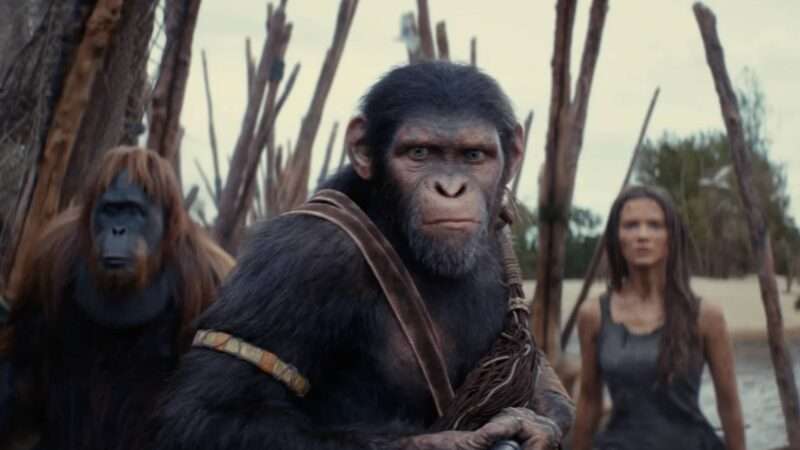
If you're looking for a political message in Kingdom of the Planet of the Apes, consider the following: The story begins "many generations" after the death of the previous reboot trilogy's hero, Caesar. Caesar was the first ape to speak, following the spread of a strange virus. Eventually, he became the leader of the apes in a war against the remnants of humanity. Caesar's teachings—apes should not kill each other, and apes are stronger together—have become quasi-religious dogma (ape-ma?) amongst the apes who live on in the post-apocalyptic world.
But those beliefs have been perverted by an authoritarian sect run by Proximus, a strutting, vainglorious bonobo bent on unifying and dominating the fragmented ape clans into something greater. Proximus preaches strength and glory; it turns out the bonobos, like all men, are obsessed with Rome. But his footsoldiers massacre peaceful ape clans, and his murderous forces wear face coverings and are known as "masks." His whole kingdom appears to be built on personal whim and something resembling slavery. Talk about a banana republic.
Masks, mad dictators, post-pandemic chaos, power fantasies of restoring Rome? Perhaps this is a story about Trump? About antifa? About revolution and empire? But no, not really. It's just a story about a bunch of animated monkeys fighting.
The sociopolitical notions about an ape society built atop the ashes of human civilization are the most interesting concepts in Kingdom of the Planet of the Apes—and the least well-explored. Rather than dig in and engage with the story's fundamentally political underpinnings, the story is, instead, content to nod in their direction while pursuing a notably less thoughtful action-adventure story.
The end result isn't bad: Kingdom of the Planet of the Apes is a solid enough summer blockbuster, with top-notch special effects and a family-friendly emotional core that most movies of this class lack. But what's frustrating is that the movie gestures at something much more interesting than what ends up on screen.
The story starts with a trio of young chimpanzees who belong to a peaceful, idyllic clan devoted to the raising of eagles. But soon their village is attacked by masked-wearing outsiders, including a silverback brute named Sylva. Truly, it's gorilla warfare.
Noa, the son of the eagle clan's leader, manages to escape. The movie then becomes a sort of road movie in which Noa must return to his tribe and free them from Proximus' authoritarian rule. Easy rider, raging apes.
Noa is no Caesar, but he's a chimp off the old block: thoughtful, full of moral conviction, yearning to grow into something more. After the attack on his village, he runs into Raka, a wise old Orangutan who has studied Caesar's teachings, and who steals every scene he's in. The pair are soon joined by Mae, a human woman who initially appears to be a mute scavenger but turns out to be something more. All of this comes to a head when Mae and Noa reach Proximus' kingdom, which consists of a gigantic, rusted-out ship that's been beached near a massive, locked bunker that he believes holds tools that will make him more powerful. There's a sort of Mad Max parallel here, but with inquisitive monkeys instead of leather-clad car fiends; perhaps this picture should have been called Furious George.
Proximus has been studying ancient Rome, with the help of Trevathan, an older human man (William H. Macy) who has accepted the notion that apes will rule the earth. Some of the movie's most interesting scenes involve Trevathan arguing with Mae about whether to accept ape dominion. But until the movie's final moments, it's not at all clear what Mae's alternative is, or why she even thinks there is an alternative. What is Mae even fighting for? Too much of the movie's worldbuilding is shuffled into what are effectively footnotes.
What's left is a relatively simple narrative about a young ape struggling to free his clan and finding himself in the process. It's competently told, and the computer character animation is consistently excellent, with everything from wet fur to minor skin blemishes convincingly rendered. Yet that impressive level of detail doesn't extend to the story, which at two and a half hours long threatens to turn this into Kingdom of the Planet of Bored Apes.
In many ways, it's a relief that the movie doesn't really attempt to be a Trump-era political tract. (Remember the Gorilla Channel?) But I do wish the story had taken its own ideas about politics and civilizational conflict a little more seriously. The movie is fine, but simian swagger aside, it doesn't have much thematic heft; Kingdom of the Planet of the Apes amounts to little more than a couple hours of monkeying around.
The post <i>Kingdom of the Planet of the Apes</i> Is Just a Lot of Monkeying Around appeared first on Reason.com.







